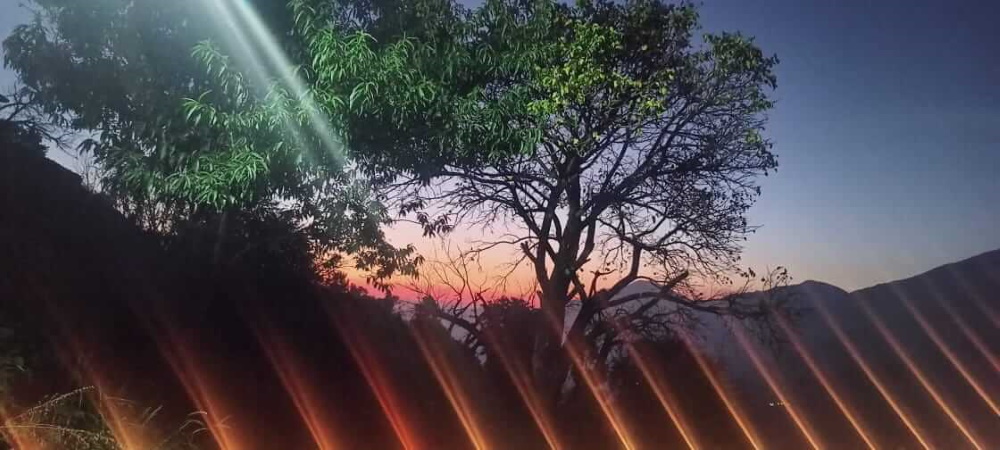
Pangot Village Stay
Village Stay at Naina Devi Bird Reserve Pangot, Nainital “Rural beauty, birders Charm” We are a locally owned rural tourism organization developed on a farm land using locally resourced materials. To keep it a low impact to the ecology. The Gaon connection “community‟ is offering to you Offbeat experience, Adventure, village experience, bird watching and explorations in Naina devi bird reserve Pangot, Nainital. We are located in the Shivalik and Middle Himalayan region of Uttarakhand.
SEASONS:-
Winter: cold and snowy but best time for bird watching and snow fall experience.
Summer: April to June: pleasant days with cool nights. Ideal time for village walk, farming experience, Jungle trek and nature relaxation.
Monsoons: July to September: Rainy days but panoramic view. Right time for farming experiences. September is good for observing flora and fauna.
Distance from major cities-
- Delhi- approx. 335kms
- Haldwani- 55kms
- Panthnagar- 90kms
Our Presence:-
Hariyal Village Stay:- Amidst natures Beauty, in a casual ambience is the car free village in Pangot, Nainital. It is an hour’s drive from Nainital. It offers a taste of rural life, the perfect balm for frayed city nerves. The altitude of 2182mts. provides a cool and pleasant climate in the summers and cold and snowy in the winters with lots of bird species to be seen around. We have skilled field guides and naturalists for making your village stay and wildlife experience unforgettable.
| Total Room | Tariff Per night | Meal Plan | Access | Approx altitude |
|---|---|---|---|---|
| 7 eco-cottage | 5400 Per cottage on twin sharing basis | MAPI | 800mt walk | 2182 Mts. |
Ghughukham Village Stay:- located in the Ghuggu Kham village in the Naina Devi Himalayan Bird Conservation Reserve (Pangot) which is a home to more than 500 species of birds.Between November and February, this place is covered with a white cover of snow. While from March to April, the place is a special treat as the state flower Rhododendron is in full bloom. This village is perfect place for village stay and farming experiences.
| Total Room | Tariff Per night | Meal Plan | Access | Approx altitude |
|---|---|---|---|---|
| 5 Cottage | 3700 Per cottage on twin sharing basis | MAPI | On Road | 1900 Mts. |
| 5 Alpine camp with common toilet | 1750 Per head/ per night | API | On Road | 1900 Mts. |
Village activity – Farming Experiences (300 INR per head), village walk (500 INR per head), pahadi Chulla Lunch (350 INR per head).
Adventure activity- Wild trail (650 INR per head), Bhramsthal Experience (650 INR per head), China peak hike (2000 Guide charge), Jungle survive (2000 INR per head).
Bird watching- Naturalist charge (3000 INR per day).
GUIDELINES FOR OUR GUEST
- As an eco-tourist, travel, respecting local culture and traditions and encouraging local pride—local cuisine, folk songs and dance, traditional dresses, local etiquette, local architecture. There is a science (gharat) and art (colour) in everything. Be friendly, inquisitive and patient. Respect holy places.
- Understand that leakage of economic benefits outside the community due to non-local ownership of tourism business is bad. Give a fair price to rural produce by buying local.
- Think eco-systems—be conservation conscious. Support friendly resource usage—water through rain water harvesting, use of non-conventional energy; if electricity is unavailable, use energy-efficient kerosene stoves.
- Be environmental sensitive respect biodiversity. Respect carrying capacity of the physical environment and the resources, knowing that overcrowding leads to a lessening of the tranquility and simplicity of life that attracts you in the first place.
- Make positive contributions to the conservation of natural and cultural heritage, maintain local harmony. Help the guides and porters to observe eco-conservation measures. Remember that erosion of cultural integrity and values due to the introduction of ‘outside’ influences is ruinous to indigenous cultures. Avoid over-use of community infrastructure.
- Keep local water sources clean and avoid using chemical detergents in streams or springs. If no toilet facilities are available, make sure you defecate atleast 30 metres away from any water source, ensuring to bury any waste. Conservation of water is vital, especially drinking water. Water from Kitchen waste or rain-water through regular harvesting be used for sanitation and use, where quality of water required is not very high. Water source should not be contaminated in any way.
- Keep travel-generated garbage at the minimum. Composts, recycles and reduced pollution are what must be practiced. Proper disposal must only be at appropriate points along the route. Leave no eye-sores. ‘Leave no trace’ principle be followed. Camping areas should be left cleaner than what you saw when you came. Remember that another party would be using the camp site after your departure. Differentiate between non & biodegradable garbage. Burn or bury paper, natural refuse and litter. Keep for recycling and don’t throw away any non-degradable garbage like plastic bags, foil, packets, glass bottles and metal cans
- See that no damage is done to vegetation. Taking away cuttings, seeds and roots without permission of the authorized persons is illegal, especially in nature reserves. Stop people from plucking flowers or leaves. They should be left as they are for all to enjoy. As much as possible keep to the treks/trails/hikes and avoid stepping on to vegetation—you destroy vital biodiversity. Avoid collecting souvenirs. Reduce impact, keeping to marked routes and paths.
- Damage to trees/vegetation must not be there. Do not carve initials on trees or spray graffiti on monuments — defacing rocks is pollution and the Apex Court too took badly to it.







